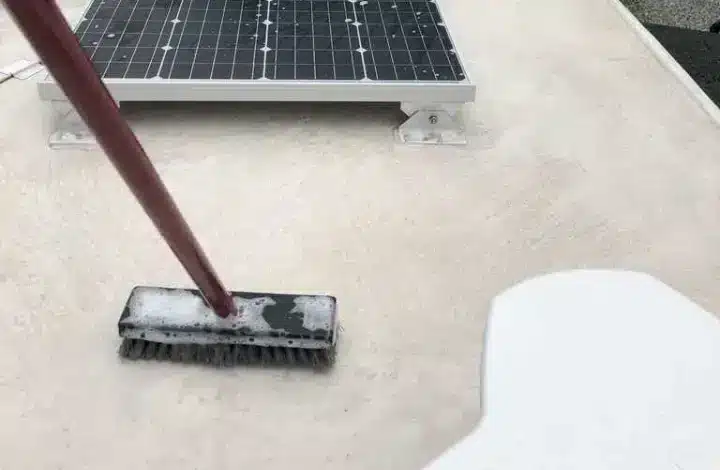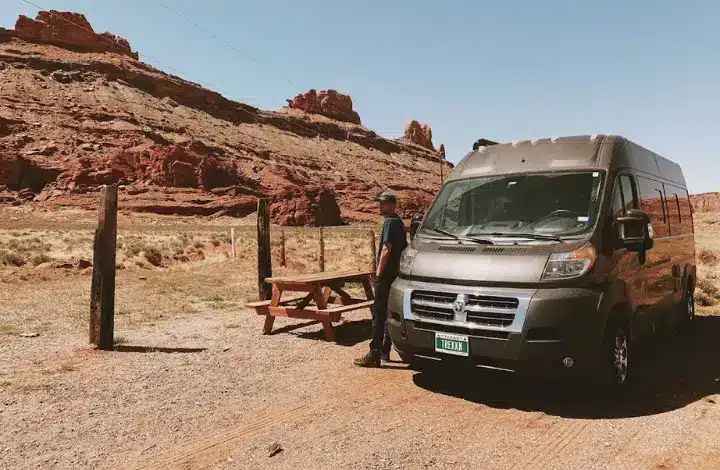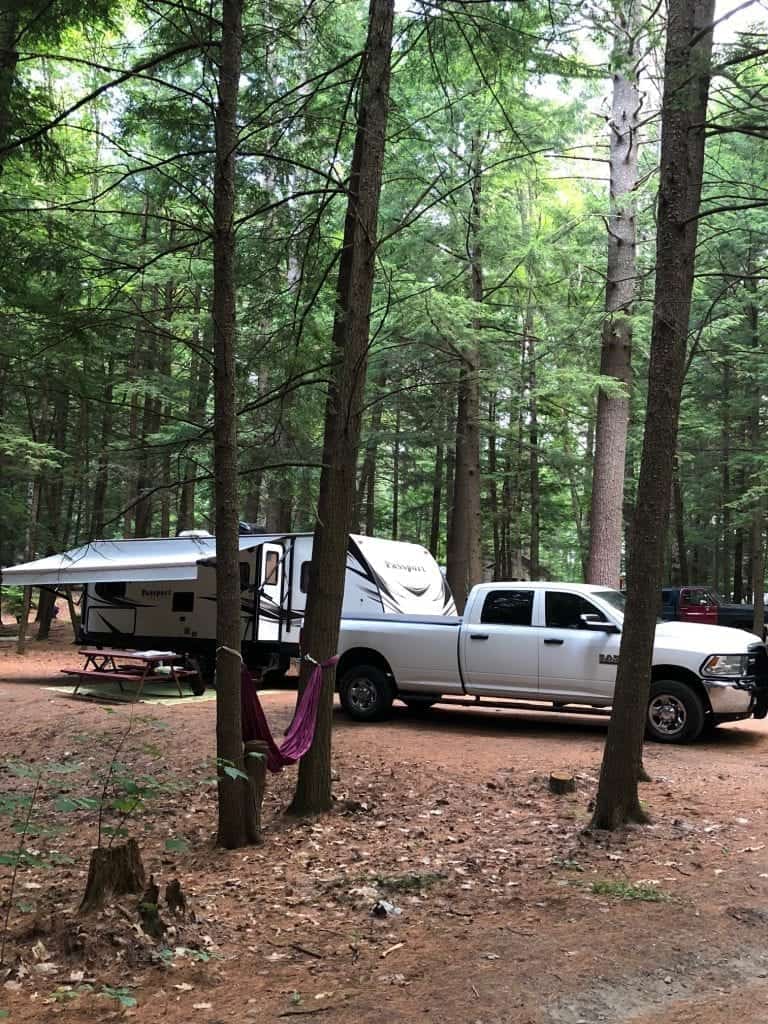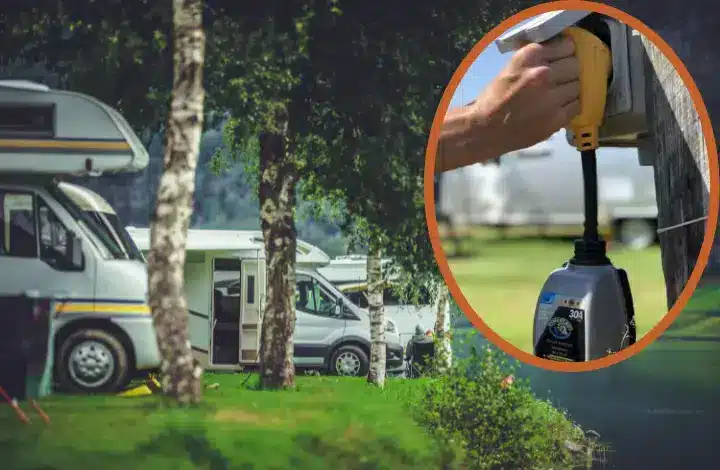Here’s Why You Should Ditch Your RV’s Factory Battery
You are on a high from the purchase of your new (or new to you) RV. You bring it home from the dealer, excited about the new camping possibilities, and quickly begin preparing for your first trip.
You get ready to leave and unplug from the house in preparation for connecting to your tow vehicle only to find that your tongue jack or landing gear won’t budge! Your battery is dead! You have GOT to be kidding me.
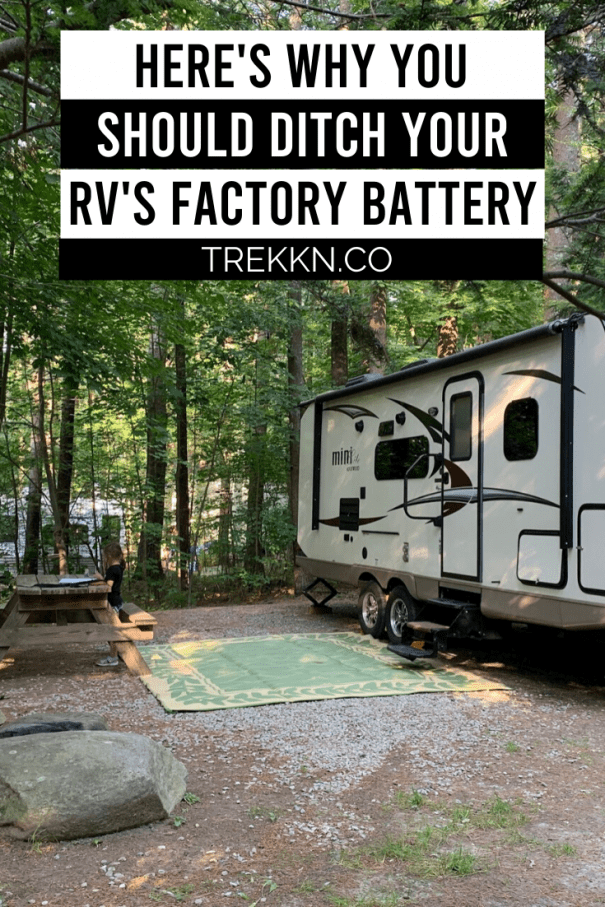
But your battery is new, right? Why would a new battery be dead?
I know, this type of situation can make you feel crazy.
Let’s cover a few reasons why you should ditch your RV’s Factory Battery and then explore which battery alternative might be the best option for your particular situation.
Hopefully, we can help you stay out of a frustrating and time-consuming dead battery situation.
What Is Wrong With My Factory-Supplied Battery?
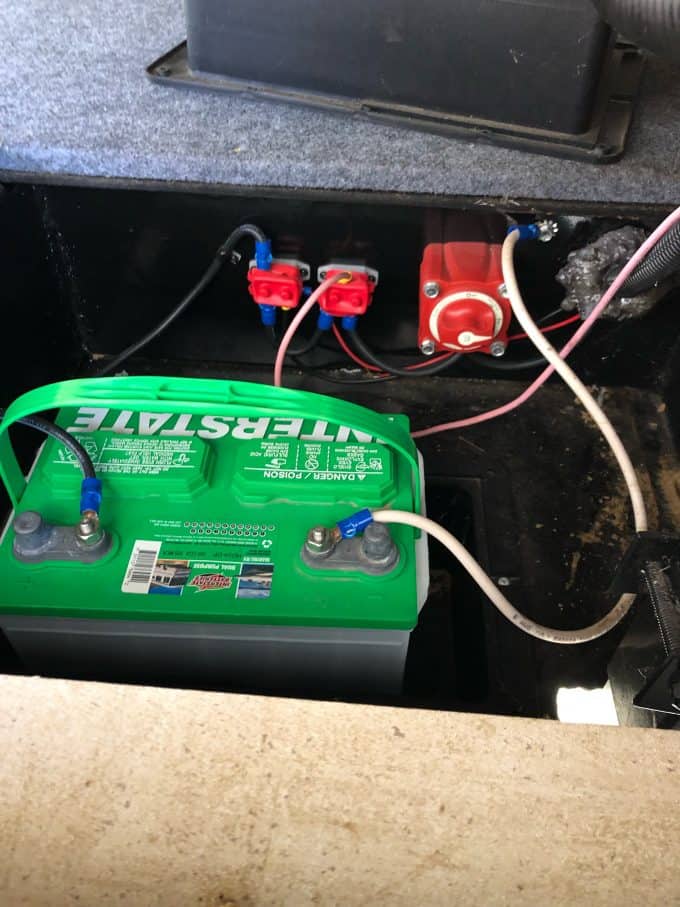
1. Your Battery Was Meant To Power a Boat
In most instances, your new RV comes with a lead acid marine grade battery straight from the dealer. We are on our fourth RV and this has been the case every time.
Relatively cheap in price, a marine-grade battery is built to function as both a deep cycle battery as well as a starter battery. This capability produces a battery that is only partially suited for the RV application.
Marine batteries are designed for deep discharges, but are also constructed for the high surge currents needed to start an onboard boat motor (hence the marine grade).
Essentially, having this type of battery in your towable RV is like hiring your accountant (who does his own car work on the weekend) to replace the blown motor in your minivan. Although he may get the job done, he still might not be the right person for the job.
And he definitely won’t be a long-term solution, much like your factory battery.
2. Your Battery Can’t Hold A Charge To Save Its Life
If you are like most Americans and RV primarily on holidays and weekends, odds are your RV spends most of the year in storage.
Your RV is a self-contained unit, and when not plugged in it relies on a slow and long power draw from the battery to sustain various appliances in the RV.
Simple items like the carbon monoxide detector are always on, creating a consistent, low power draw from that marine grade battery. As a result, the next time you pull your RV from storage the battery is dead.
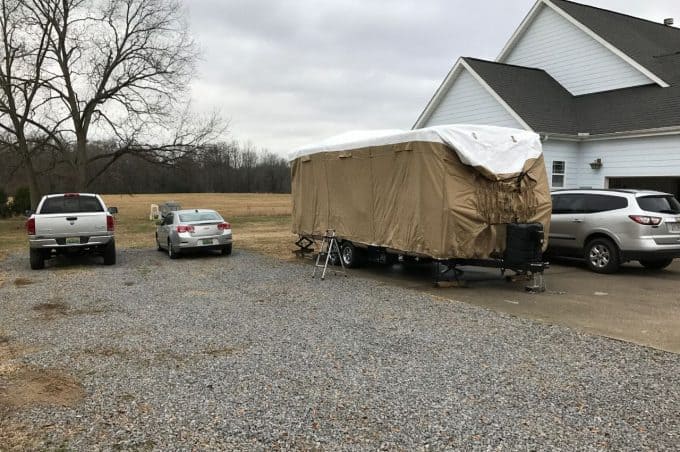
A completely depleted battery will not hold many more charges, and at some point will not charge at all. So you need to avoid this depletion if at all possible to save yourself money and frustration.
Hint: If you don’t need any power going to your RV, disconnect your battery cables from the terminals when it is not in use. This will avoid depleting it completely and shortening its life.
3. Your Battery Can’t Run Much More Than Lights
The marine battery is excellent in its own right, but it doesn’t have the charge capacity to run any of your RV appliances, lights, or anything else beyond a few hours.
If you are more than a weekend camper, then your battery is not going to cut the mustard.
For a long road trip, a stay in a National Park or even just a weekend of dry-camping, you need a battery (and battery system) that is going to be able to keep up with your power needs for an extended period of time.
That factory battery will definitely not fit the bill here.
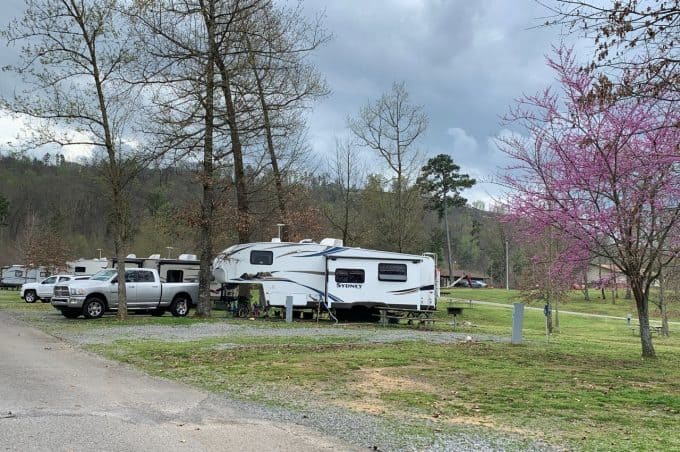
What Are Your RV Battery Options?
There are several types of batteries composed of various chemical compounds – Lead acid, AGM, and Lithium being the primary players.. Each has its place, and we will try to show the best applications of each.
Everyone has a different camping style and has to weigh the pros and cons of each type to find the best one suited for them and their individual power needs.
Lead Acid Batteries
Lead acid batteries have been around for over 150 years.
They consist of a series of lead plates in an electrolytic solution, usually sulfuric acid. They are used every day in your car or truck and are the first choice among dealers and owners to place in your RV, primarily because they are the least expensive option.
In particular, deep cycle batteries are designed for deep and long discharges for applications like an RV, golf cart or device such as a floor scrubber.
Most Lead acid batteries must be mounted in the upright position and well ventilated. They are not a sealed battery and as a result of their chemical processes, they produce hydrogen and oxygen during the charging and discharging cycles.
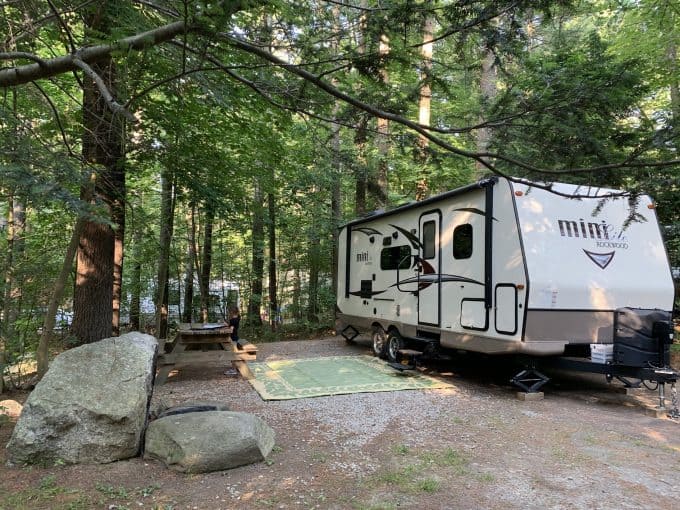
Long Charging Times and Ongoing Maintenance
Lead acid batteries charge relatively quickly up to 80 percent, but then take at least two to four hours to finish their charging cycle and reach 100 percent charged.
This type of battery also requires maintenance by adding distilled water to the battery cells to keep the electrolyte at the appropriate levels.
Failure to maintain the water level in the battery will cause the battery to die prematurely.
If you currently have this type of battery in your RV, be sure to maintain it properly to prolong its life and performance until you are able to replace it with a better option (if that is what you decide you need).
AGM Batteries
AGM batteries, or Absorbed Glass Mat, are a type of lead acid battery developed by the military in the 1980s. They are constructed with fiberglass mats sandwiched between lead plates. The electrolyte is held in the fiberglass mats.
This construction allows the battery to be slightly lighter in weight and to be sealed to prevent explosive type gases from being released.
It also allows the battery to be mounted in many orientations, an advantage if you end up having to mount your battery in an abnormal space (e.g. not the tongue on a travel trailer or the battery compartment in a fifth-wheel).
AGMs charge in a similar manner to regular lead acid batteries. However, since AGM batteries are sealed they require no maintenance. And that’s always a nice feature!
Lithium Batteries
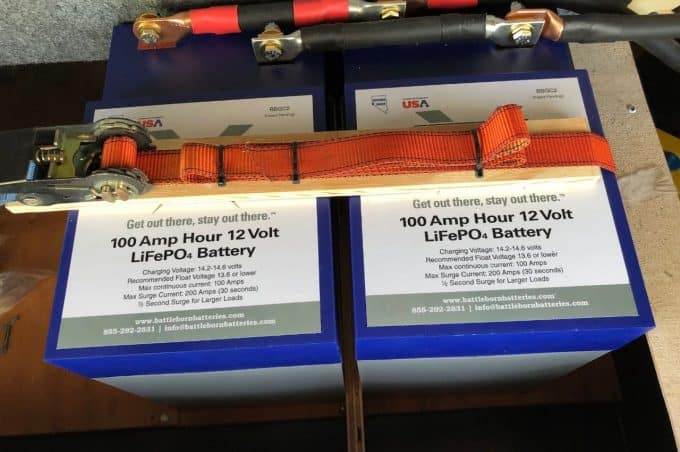
Lithium is the newcomer to the family of RV batteries. Exxon experimented with Lithium battery technology during the late 70s oil shortages.
The idea was to produce a battery that had a high energy density and could be charged in a fraction of the time of the current technology.
Today, six different chemistries exist among Lithium batteries, the most popular of which is Lithium-ion batteries. Lithium-ion batteries are commonly used in smaller electrical devices like your cell phone, laptop, or smartwatch.
For RVs, Lithium batteries usually follow the LiFePO4 chemistry (Lithium Iron Phosphate). This chemistry is an extremely stable platform that eliminates the risk of fire due to overcharging or overheating.
Battery Management Systems
Due to their unique charging profiles, manufacturers include a battery management system or BMS when this type of battery is on board.
The BMS handles all aspects of the battery charge and discharge cycles, monitors the temperature of the battery, and can shut down the battery for safety reasons if needed.
Lithium batteries can charge quickly, regardless of their discharge level. They are also a sealed battery, so they require zero maintenance.
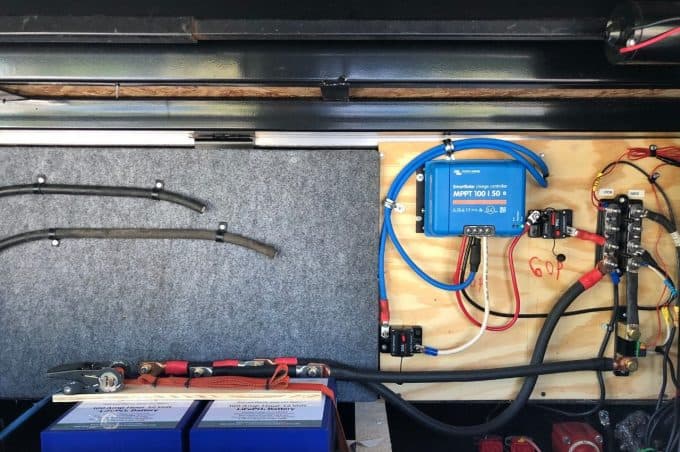
What Kind Of Battery Do YOU Need?
To determine which type of battery is best for you, you need to consider your RV travel style. Are you a weekender? Are you a roadtripper? Are you a boondocker?
The answer will help you determine the battery that is right for you.
Batteries for Weekend RVers
If you strictly travel in your RV for weekends and major holidays, then this is your section.
A good 12-volt deep cycle non-marine lead acid battery is your ticket. It takes a charge extremely well from the onboard RV converter/charger that comes with your RV.
It also has great deep cycle capabilities for when you are not plugged in.
As long as your batteries don’t discharge past the 80% mark, you are good to go. Deep cycle 12-volt batteries are the cheapest of the bunch and can be found at most local RV and big box stores for very reasonable prices.
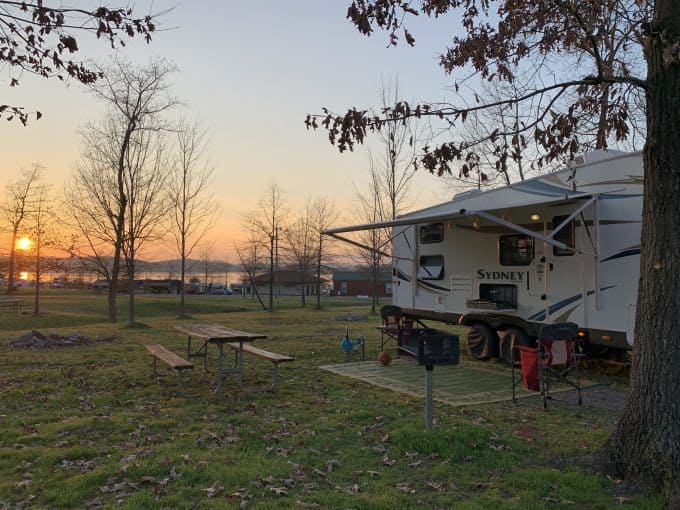
Batteries for Roadtripping RVers
If your travel style extends beyond just the weekend, you may opt for a little more complex (and expensive) setup. You can opt for a higher capacity lead acid battery or upgrade to an AGM battery setup.
I replaced our travel trailer factory battery with two 6 volt lead acid batteries (two 6 volts wired in series will produce the necessary 12 volts!).
This configuration can also be accomplished with two AGM 6 volts. The result is that the power capacity of the two 6 volt batteries is much higher than one 12 volt battery.
This setup came in handy on some week-long trips that required overnight stays in Walmart parking lots and when we dry camped in Grand Canyon National Park.
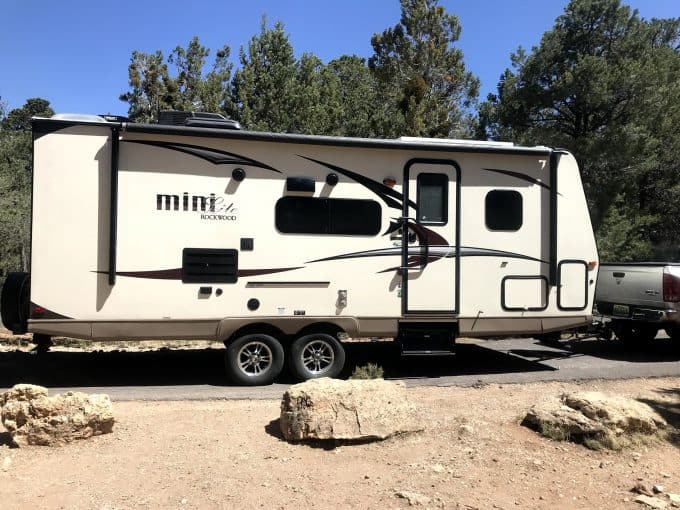
Consider a Two Battery Setup
A two battery setup will charge well once you get to the campground and plug your RV into the power pedestal or when you plug your generator in to charge the batteries.
The AGM’S and the 6-volt regular lead acid batteries are a bit more expensive than the standard 12-volt battery. However, the advantages and versatility they provide make the price point worth the extra money to upgrade if you truly like to escape in your RV for extended periods of time.
Batteries for Dry Camping and Boondocking RVers
If you are in this camp, you are looking to get the most use out of your RV and your RV battery. You need some added performance, just like we did.
We have slowly migrated into this camp over the last few years. Our newest RV, a 31 ft long Sydney Outback Fifth Wheel, is currently outfitted with two 12 Volt Battle Born Lithium Batteries.
They are truly meant to be used off-grid, which is evident in Battleborn’s catchphrase of “get out there and stay out there”.
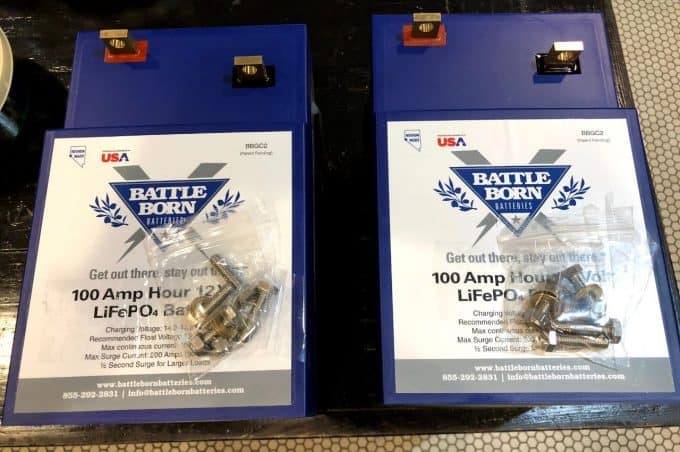
Other lithium battery brands include Lion Energy, Re-lion, and Renogy. Each has its own advantages and disadvantages, but all produce great lithium batteries. Lithium batteries have lots of features to love, but also come with a much higher price.
We have spent enough time in parking lots and National Parks with no hook-ups to know that the cost of lithium batteries is worth it to us. We enjoy the challenge of living off the grid and exploring areas typically not found around your local campground.
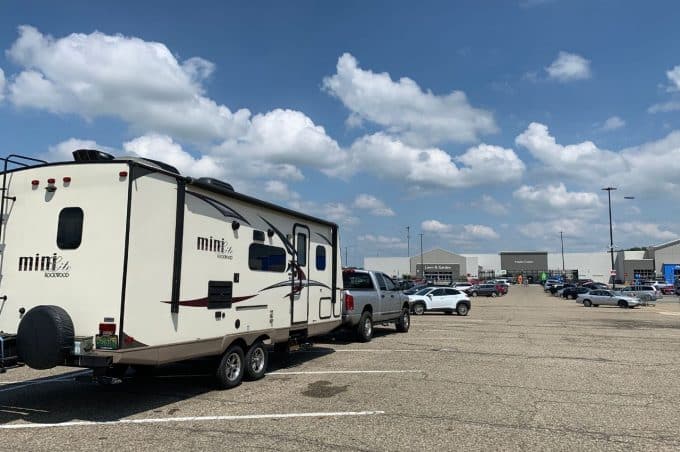
If you dream of really going off the beaten path and exploring the lonelier places our country has to offer, set your sights on these lithium batteries to fuel your wanderlust and keep you out of an inconvenient (dead battery) situation on the road.
A New Battery Equals New Camping Experiences
When you ditch your RV’s factory-supplied battery, you will be improving your overall RV setup and opening the door to brand new, and exciting, camping experiences.
If the battery of your dreams is not within reach today, stay tuned because tomorrow it may be. The great thing about energy technology is that it is always changing. Better technology gets cheaper as new innovations come along on a very consistent basis.
So whether you are camping at the local campground or exploring the wide-open backcountry spaces at one of America’s National Parks, your new battery (or batteries) will serve you well and open up new opportunities for you.
And, at the very least, hopefully, it won’t leave you stuck at home with a dead battery! We hope to see you out on the open road very soon.
PIN THIS

Nick and Kelsey Hensley are part-time RVers and full time adventure seekers. Nick is a Rocket Scientist by day and a Certified RV Technician by night. Kelsey works as a freelancer, photographer and digital ninja. With their two kids, the Hensleys road trip across the country every summer on their quest to see all 63 National Parks. On the weekends you can find this nerdy crew at a campground, historic site, or checking out the newest restaurant in town.




